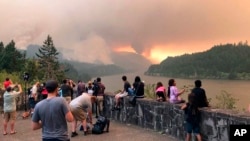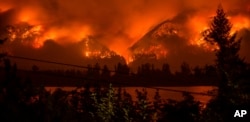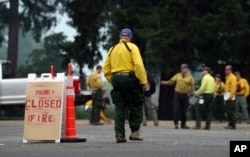A fast-moving wildfire chewing through Oregon’s forestland is threatening more than homes and people. It’s also devouring the heart of the state’s nature-loving identity.
As flames erupted this week in the Columbia Gorge, horrified Oregonians mourned the devastation of beloved day trails, swimming holes and dozens of crystalline waterfalls that are all an easy day trip from Portland.
The Columbia River Gorge National Scenic Area attracts more than 3 million tourists a year and holds North America’s largest concentration of waterfalls, including 77 named cascades. It is also home to 800 wildflower species, including 16 found nowhere else in the world.
The gorge’s winding trails are lush with ferns, hidden pocket waterfalls and stunning vistas of the mighty Columbia River. They are most cherished by Oregonians, who feel a deep connection to an area that’s often referred to as Oregon’s “crown jewel.”
As the flames spread through the gorge’s forests at an alarming rate, social media lit up with posts recalling favorite hikes, memories of gorge weddings and worries about what will remain when the smoke clears.
“Everybody has this visceral attachment to what they care about there and that all feels like it’s slipping through our fingers,” said Kevin Gorman, executive director of Friends of the Columbia Gorge. “We literally are waiting until the smoke clears to go out and assess what’s there, what we’ve lost and then try to move on from there.”
Fires merge
On Wednesday, two fires merged to form a blaze of more than 50 square miles (130 square kilometers). The fire has closed a 30-mile (78-kilometer) stretch of nearby Interstate 84 and forced the evacuation of hundreds of homes on the far eastern fringes of Portland’s metropolitan area. Authorities say the fire was started by a 15-year-old boy who tossed fireworks into the woods.
Scorching heat, bone-dry vegetation and winds of 30 to 40 mph pushed the flames 13 miles (34 kilometers) in 16 hours at one point, an almost unprecedented rate of fire spread, authorities said. Embers from the blaze also were carried by winds across the Columbia River and started a spot fire on the opposite bank in Washington state.
On the Oregon side, the flames had some of the gorge’s most treasured spots in its crosshairs.
Lodge saved, falls unknown
After an all-night battle, fire crews saved the historic Multnomah Lodge, a historic 92-year-old information center, bar and restaurant at the base of Multnomah Falls.
That waterfall, visible and easily accessible from Interstate 84, alone attracts more than 2 million visitors a year from around the world. A low bridge allows easy viewing and a steep one-mile (1.6 kilometer) hike allows visitors to peer down 620 feet (190 meters) from just above its drop-off while taking in a panoramic view of the Columbia River and Washington state on the far bank.
Oneonta Falls, famous for a hike that includes wading in waist-deep water through a steep-walled canyon, was also charred. Photos posted on Twitter show a popular pedestrian tunnel near the gorge ringed with flames. The fate of other waterfalls with wistful names — Bridal Veil, Horsetail Falls and Ponytail Falls among them — was still uncertain.
“I’ve been where that fire began and I’ve looked off that cliff and to imagine all that destroyed and all that gone, what I took for granted would be there forever, I just can’t believe it,” said Andrew Damitio, a 20-year-old who grew up hiking the gorge.
Unique geography, but a hot summer
The U-shaped canyon that holds the Columbia River is unique in its geology and contains microclimates nurtured by up to 70 inches (180 centimeters) of rain annually, Gorman said. But this summer has been unusually dry and extremely hot, creating an opportunity for a large fire to take hold in what is usually a lush forest, he said.
Gwen Farnham, a Portland resident and native Oregonian, belongs to four hiking groups and visits the gorge four times a week during the peak summer season. She has spent the past several days trying, without success, to learn what has burned and what has not in a place she reveres.
“It just has this amazing ability to actually transform me and move energy in me and take me to an incredibly happy place. I call it my church,” said Farnham, who serves on the board of Friends of the Columbia Gorge. “I’m grief-stricken. I’m just sick. It’s like a family member has died.”
Area survived earlier fires
The gorge has burned before, and will likely burn again.
In 1902, a massive wildfire scorched the same area and also jumped the river to the Washington side. And in 1991, flames crept to within a few yards (meters) of the same lodge that fire crews battled to save this week. The scars from that blaze were still visible amid the forest before this year’s fire started, Gorman said.
Authorities sought to reassure the public even as they lamented the devastation.
Lt. Damon Simmons, a spokesman with the Oregon Fire Marshal, Wednesday drove the historic Columbia River Highway, a winding, two-lane road that parallels the river on the Oregon side and offers majestic viewpoints from the gorge’s steep cliffs. He came back with a hopeful message.
“The gorge still looks like the gorge,” he said. “It’s not a wasteland. It’s not a blackened, destroyed no man’s land.”
That’s some consolation for Farnham, who has been fielding calls from concerned friends all week.
“The gorge is an amazingly resilient place,” she said. “We’ll have to get to work and do what we can, each and every one of us.”






